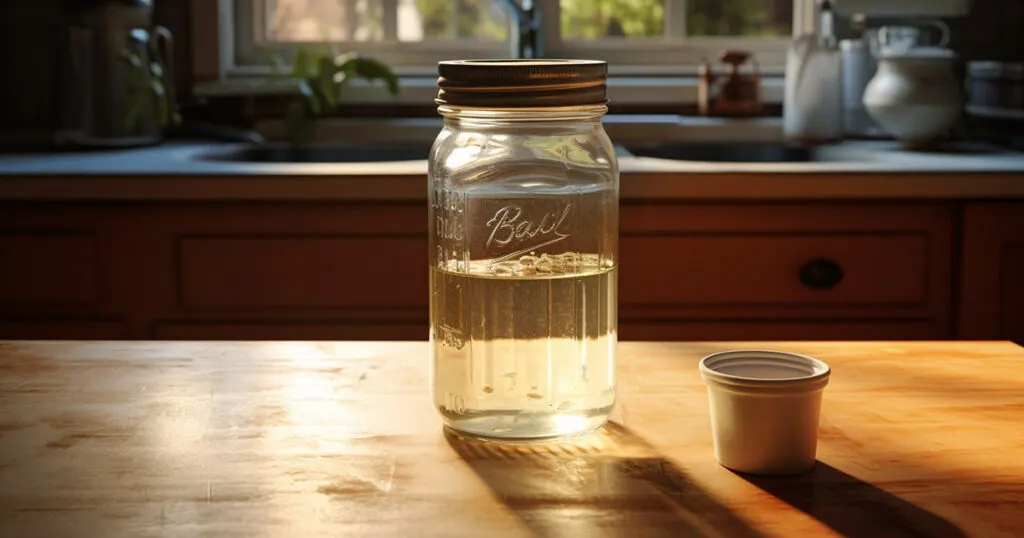When it comes to preparing for an emergency, most people think of stocking up on canned goods, water, and first aid supplies. However, there is one item that often gets overlooked but is incredibly versatile and useful in any household: vinegar. Here are some reasons why vinegar is a great option to have in your home storage supplies.

Preservative
Vinegar has been used for centuries as a natural preservative. Its acidic nature inhibits the growth of harmful microorganisms in food, extending its shelf life. This is especially useful in emergency situations when refrigeration might not be available, and you need to store food for longer periods. For example, pickling vegetables in vinegar can extend their shelf life for months, providing a long-lasting source of nutrients.
Cleaning Agent
Vinegar is a natural and non-toxic cleaner. Mixed with water, it can be used to clean surfaces, remove odors, and even unclog drains. Its acidity helps dissolve mineral deposits, grease, and grime, making it effective for cleaning a variety of surfaces in your home, from countertops to bathroom tiles. Additionally, vinegar is an eco-friendly alternative to chemical cleaners, which can be harmful to the environment and your health.
Disinfectant
Vinegar has antibacterial properties that make it effective in killing many strains of bacteria and viruses on surfaces. While it is not as effective as commercial disinfectants in killing all types of germs, it is a good alternative when other options are not available. For example, during a shortage of disinfecting products, a vinegar solution can be used to clean surfaces that are not in direct contact with food.
Health Benefits
Consuming vinegar can have several health benefits, including aiding digestion, helping control blood sugar levels, and aiding weight loss. The acetic acid in vinegar can help break down food in the stomach, aiding digestion and preventing discomfort. Additionally, some studies have suggested that vinegar can help lower blood sugar levels after meals, which can be beneficial for people with diabetes.
Gardening
Vinegar can also be useful in the garden. It can be used as a natural herbicide to kill weeds, as its acidity can break down the cell structure of plants. Additionally, vinegar can be used to clean garden tools and to keep pests away from your plants. However, be careful when using vinegar in your garden, as it can also harm beneficial plants and insects.
Personal Care
Vinegar can be used as a natural remedy for several skin conditions, as a hair rinse to remove buildup, and as a natural deodorant. Its acidity helps balance the pH of the skin, which can help reduce acne and other skin problems. Additionally, rinsing your hair with vinegar can help remove buildup from hair products and leave your hair shiny and smooth.
Cooking
Last but not least, vinegar is a common ingredient in many recipes, from salad dressings to marinades and pickles. It adds flavor and acidity to dishes, enhancing their taste. Additionally, vinegar can be used as a tenderizer for meats and as a leavening agent in baking.
What are a few frequently asked questions about vinegar?
What’s the best type of vinegar to store?
White vinegar is often considered the best type of vinegar to store for several reasons:
- Versatility: White vinegar can be used for all the purposes mentioned in the blog post – from preserving food, cleaning, disinfection, gardening, personal care, to cooking.
- Shelf Life: White vinegar has an almost indefinite shelf life. It does not lose its acidity over time as some other vinegars might.
- Non-Staining: Being clear, it won’t stain surfaces, clothes, or containers. This makes it especially good for cleaning and laundry uses.
- Cost: It is usually the least expensive type of vinegar, making it economical for bulk storage.
- Availability: White vinegar is commonly available in large quantities.
Why is vinegar and baking soda a great combination?
Vinegar and baking soda is a great combination for several reasons:
- Chemical Reaction: When combined, vinegar (an acid) and baking soda (a base) react to neutralize each other, creating carbon dioxide (a gas) and water. This reaction helps in lifting dirt and stains, making it an effective cleaning agent.
- Deodorizing: Baking soda is excellent at absorbing odors, while vinegar helps to neutralize smells. When used together, they can effectively remove unpleasant odors.
- Unclogging Drains: The reaction between vinegar and baking soda can help in unclogging drains. The fizzy reaction helps to break down the gunk, hair, and dirt that accumulates in the pipes.
- Safe and Non-Toxic: Both vinegar and baking soda are natural, non-toxic, and eco-friendly. This makes them safe to use around children and pets, and they are better for the environment than chemical-based cleaning agents.
- Versatility: The combination of vinegar and baking soda can be used for a variety of cleaning tasks, from removing stains on clothes and carpets to cleaning kitchen surfaces and bathroom tiles.
How do you use vinegar for pickling and what is safe to pickle with vinegar?
Vinegar is an essential ingredient in pickling because its acidity creates an environment where harmful bacteria, which could potentially cause food poisoning, cannot survive. The acidity of the vinegar (acetic acid) preserves the food and gives pickles their characteristic tangy flavor.
Here are the general steps to use vinegar for pickling:
- Choose the Right Vinegar: White vinegar or apple cider vinegar are commonly used for pickling. Make sure to use vinegar with at least 5% acidity.
- Prepare the Vegetables: Wash the vegetables thoroughly and cut them as desired. Some vegetables like cucumbers can be pickled whole.
- Prepare the Brine: The brine is the liquid that the vegetables will be pickled in. It usually consists of vinegar, water, and salt. Some recipes may also include sugar or other spices. Bring the brine to a boil and then let it cool.
- Pack the Jars: Pack the prepared vegetables into sterilized canning jars. Add any additional spices or herbs that you want to flavor the pickles with.
- Add the Brine: Pour the cooled brine over the vegetables in the jars, making sure to cover the vegetables completely. Leave some headspace at the top of the jar.
- Seal the Jars: Wipe the rims of the jars clean and seal them with sterilized lids and rings.
- Process the Jars: Process the jars in a boiling water bath canner to ensure that they are sealed properly and to kill any remaining bacteria. The processing time will vary depending on the recipe and the size of the jars.
- Store the Jars: Once the jars have been processed and sealed, store them in a cool, dark place for the recommended time before consuming. This allows the flavors to develop.
What is Safe to Pickle with Vinegar?
Most vegetables are safe to pickle with vinegar. Common choices include cucumbers, onions, carrots, cauliflower, green beans, and peppers. Fruits like apples and pears can also be pickled. It is important to use fresh, high-quality produce for the best results.
In conclusion, vinegar is a versatile and useful item to have in your home storage supplies. From preserving food to cleaning surfaces, gardening, and personal care, it has a wide range of applications that can be helpful in both everyday life and emergency situations. So next time you are preparing your home storage, don’t forget to include a good supply of vinegar. #ProperPrep
